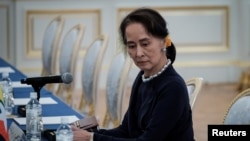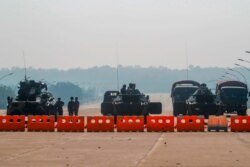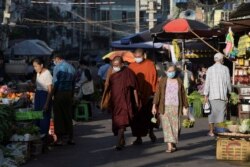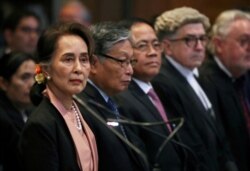Authorities in Myanmar have filed charges against detained de facto leader Aung San Suu Kyi for violating import-export laws, two days after the military seized power.
A press officer for her National League for Democracy party said Wednesday on his official Facebook page that Aung San Suu Kyi was ordered held for two weeks. NLD legislator Phyo Zayar Thaw also confirmed the charges.
She was detained along with other leaders, including President Win Myint, on Monday as the military staged a coup.
A police document alleges Aung San Suu Kyi illegally imported and used without consent six unregistered walkie-talkie radios that were found in a search of her home in the capital of Naypyitaw.
The document indicates the communications equipment was for her bodyguards. It also says Aung San Suu Kyi’s detention was requested “in order to question witnesses, request evidence and seek legal counsel after questioning of the defendant.”
Authorities also charged Win Myint with violating coronavirus containment measures while campaigning for last November’s election, according to a separate police document.
Court, police and government officials did not immediately comment, but the chair of the ASEAN Parliamentarians for Human Rights denounced the charges as nonsensical. ASEAN is the Association of Southeast Asian Nations.
“This is an absurd move by the junta to try to legitimize their illegal power grab,” Charles Santiago said in a statement.
The NLD party also said in a statement Wednesday that authorities had raided its offices in multiple regions of the country.
Foreign ministers from the G-7 group of nations on Wednesday condemned the coup.
"We are deeply concerned by the detention of political leaders and civil society activists, including State Counsellor Aung San Suu Kyi and President Win Myint, and targeting of the media,” the foreign ministers of Canada, France, Germany, Italy, Japan and the United States said in a statement.
They called on Myanmar’s military to end its declared state of emergency and to allow unrestricted humanitarian access to support the most vulnerable people in the country.
"The November election results must be respected and Parliament should be convened at the earliest opportunity,” the G-7 ministers said.
Medical workers protest coup
Wednesday also brought a work stoppage by staff at 70 hospitals and medical departments in 30 towns to protest the coup.
A statement from the newly formed Myanmar Civil Disobedience Movement said the army had put its own interests above a population facing hardships during the pandemic that has killed more than 3,100 people in Myanmar.
A U.S. State Department official told reporters Tuesday the government had officially declared the military takeover earlier this week a coup, a designation that “triggers certain restrictions on foreign assistance to the government.”
The official said the United States “will take action against those responsible,” but will continue programs that help the country’s citizens, including humanitarian assistance and democracy support initiatives.
Year-long state of emergency
The Myanmar military said its seizure, set to last one year, was necessary because the government had not acted on claims of voter fraud in November elections that were overwhelmingly won by Aung San Suu Kyi’s NLD party. A new session of parliament had been due to begin Monday.
U.S. Senate Minority Leader Mitch McConnell said Tuesday the United States will need “the help of our friends and allies” to pressure Myanmar’s military.
“It is time for freedom-loving nations to stand up for democracy and impose their own meaningful costs on the military junta,” McConnell said.
U.S. officials have “not been able” to speak with NLD members, the State Department official said, and added that “most of the senior officials are under house arrest.”
Myanmar, also known as Burma, has long struggled between civilian and military rule but until the coup had been enjoying a hopeful transition to democracy.
Myanmar history
A British colony until 1948, Myanmar was ruled by dictators backed by the military from 1962 to 2010.
An uprising in 1988 pushed for an election in 1990, which the NLD party won in a landslide, but the elected members of parliament were imprisoned, and the dictatorship continued.
Aung San Suu Kyi, the daughter of Myanmar's independence hero, General Aung San, who was assassinated in 1947, emerged as a leader in the pro-democracy rallies and in the NLD. She was awarded the Nobel Peace Prize in 1991 while under house arrest.
In 2010, Senior General Than Shwe announced the country would be handed over to civilian leaders, who included retired generals. They freed political prisoners, including the lawmakers from the National League for Democracy, and Aung San Suu Kyi, who was elected in a 2012 by-election and later became the state counsellor of Myanmar.
But Aung San Suu Kyi, 75, while popular among Myanmar’s Buddhist majority, has seen her international reputation decline over her government’s treatment of the country's mostly Muslim Rohingya minority.
In 2017, an Army crackdown against the Rohingya, sparked by deadly attacks on police stations in Rakhine state, led hundreds of thousands of Rohingya to flee to neighboring Bangladesh. The International Criminal Court is investigating the country for crimes against humanity.
State Department correspondent Nike Ching contributed to this report.



















